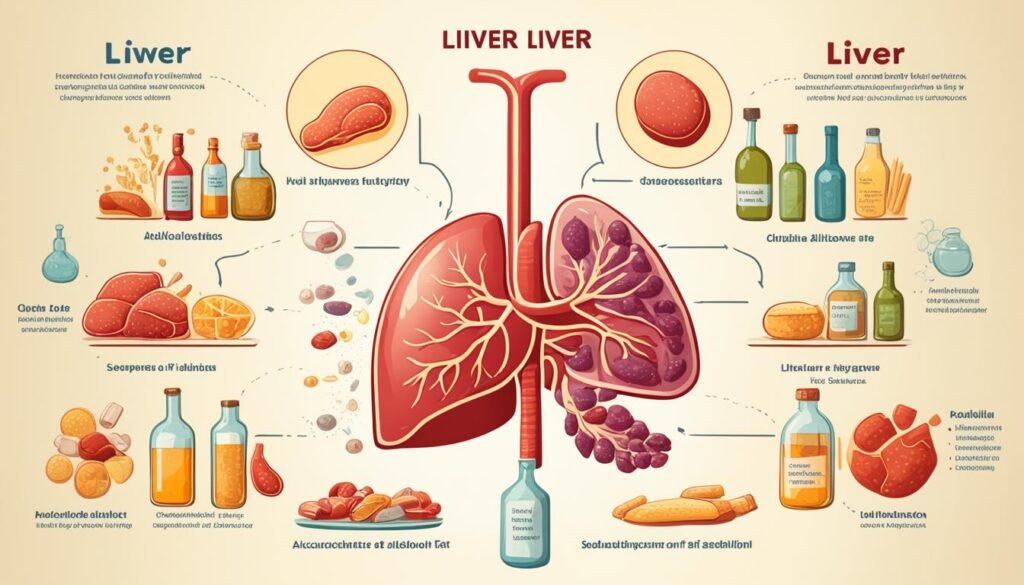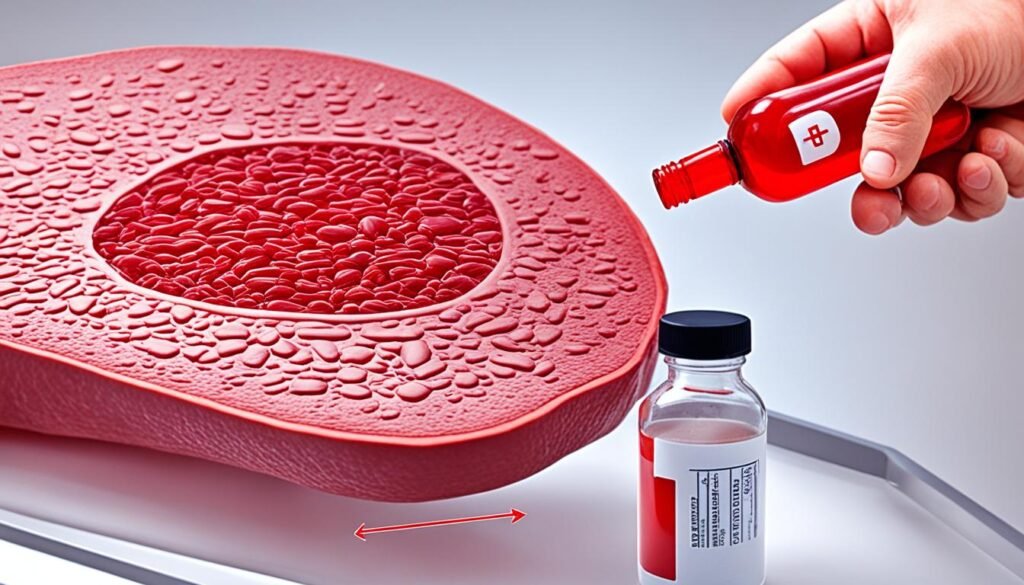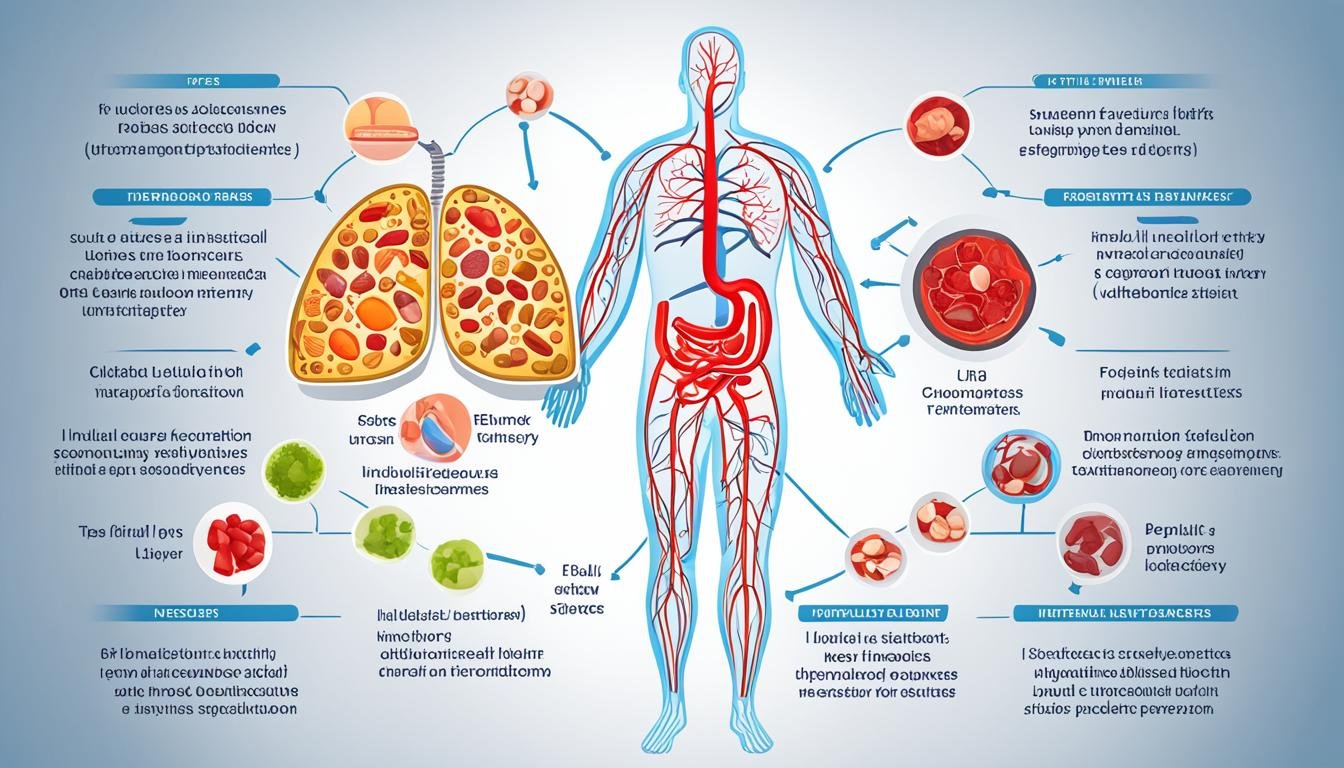Fatty liver disease happens when too much fat builds up in the liver. It’s linked to obesity, insulin resistance, type 2 diabetes, and high blood fats. It can also be because of genetics. The condition can vary a lot. It might just be a simple fatty liver without symptoms. Or it could progress to NASH, which has inflammation and can lead to liver scarring or cancer. Drinking too much alcohol can also cause this issue.
To prevent fatty liver disease, it’s important to maintain a healthy weight. A balanced diet and avoiding too much alcohol are crucial. If you have underlying health conditions, managing them can also help. These are all key steps in keeping your liver healthy.
Key Takeaways:
- Fatty liver disease, or hepatic steatosis, is characterized by the accumulation of excess fat in the liver.
- Causes of fatty liver disease include obesity, insulin resistance, type 2 diabetes, high levels of fats in the blood, and genetic predisposition.
- The disease can range in severity from simple fatty liver to nonalcoholic steatohepatitis (NASH), which involves inflammation and can progress to liver scarring and cancer.
- Excessive alcohol consumption can lead to alcoholic fatty liver disease.
- Maintaining a healthy weight, following a balanced diet, limiting alcohol consumption, and managing underlying health conditions are key in preventing and managing fatty liver disease.
Nonalcoholic Fatty Liver Disease (NAFLD)
| Factors | Impact |
|---|---|
| Fatty liver causes | Excess fat accumulation |
| Liver disease risk factors | Obesity, insulin resistance, type 2 diabetes, high blood fat levels |
| Other risk factors | Family history of fatty liver or obesity, polycystic ovary syndrome, sleep apnea, hypothyroidism |
Nonalcoholic fatty liver disease (NAFLD) is common but not from drinking alcohol. It often happens to those who are overweight, have type 2 diabetes, or insulin resistance. It’s when the liver has more fat than it should. NAFLD can be mild with just fat in the liver, or it can lead to more serious conditions like NASH. NASH means there’s also inflammation or scarring in the liver.
NAFLD risk increases with family history, obesity, and certain medical conditions. Notably, conditions like polycystic ovary syndrome and sleep apnea, along with hypothyroidism. If too much fat accumulates in the liver, NAFLD is more likely to develop or get worse. To manage NAFLD, it’s crucial to deal with its causes and make lifestyle changes.
Eating healthy and staying active is key to prevent and manage NAFLD. A balanced diet that’s low in unhealthy fats is important. Focus on eating whole foods like fruits, veggies, and grains to keep your liver healthy. This can also lower the chance of complications from NAFLD.
It’s also vital to control conditions like insulin resistance and diabetes. These can worsen NAFLD and harm your liver. Working closely with your doctor to treat these conditions, as well as managing other risk factors, is crucial for effective NAFLD management.
To keep NAFLD at bay, make positive changes in your life. This includes watching your weight, eating well, and controlling health conditions. For the best advice on how to take care of your liver, talk to a healthcare expert. They can give you tips tailored just for you.
Alcoholic Fatty Liver Disease (ALD)
Drinking too much alcohol is the main reason for alcoholic fatty liver disease (ALD). The liver processes alcohol, turning it into fat. Over time, this can harm the liver.
ALD starts with a simple fatty liver but can lead to liver inflammation or alcoholic cirrhosis. Alcoholic hepatitis is when the liver is inflamed. Alcoholic cirrhosis happens when the liver gets a lot of scar tissue.
The key to avoiding ALD is to not drink too much or quit drinking. It’s also important to live healthily. This means eating well, exercising often, and getting help to stop drinking.
Alcoholic Fatty Liver Disease Prevention Tips:
- Avoid or limit alcohol consumption
- Seek support from healthcare professionals or support groups for alcohol cessation
- Maintain a balanced diet that includes a variety of fruits, vegetables, whole grains, and lean proteins
- Engage in regular exercise to support overall health and weight management
Drinking a little alcohol might be okay, but drinking too much is harmful to the liver. It’s wise to be aware of how much you drink in order to keep your liver healthy.
By using these liver health tips and living a healthy life, you can lower your chance of developing alcoholic fatty liver disease.

ALD Overview:
| Type | Description |
|---|---|
| Simple Fatty Liver | Fat buildup in the liver without swelling or major damage |
| Alcoholic Hepatitis | Liver swelling from drinking alcohol |
| Alcoholic Cirrhosis | Lots of scarring and liver trouble due to drinking |
While alcohol is the main cause of ALD, things like genetics, diet, and overall health also play a part. Getting advice from health experts is key to dealing with ALD well.
Metabolic Dysfunction-Associated Steatotic Liver Disease (MASLD)
Metabolic dysfunction-associated steatotic liver disease (MASLD) is now a defined term, spotlighting the link between liver fat and health risks like obesity and diabetes. It covers plain fatty liver and the more severe nonalcoholic steatohepatitis (NASH). NASH brings liver inflammation.
The best way to deal with MASLD is to live healthy. This means keeping a good weight, eating right, staying active, and handling health issues properly. A good weight is a big step for liver health and lowers the chance of hepatic steatosis. If you want to know what to eat and how much, ask a doctor or a diet expert.
Eating well is key for your liver; think fruits, veggies, whole grains, lean meats, and good fats. Skip or cut down on foods high in bad fats and added sugars to lessen liver fat build-up. Moving more, like with walking or swimming, helps manage weight and keeps you healthy. Find an exercise you like and can do regularly.
Adding colorful fruits and veggies to your meals helps your liver with antioxidants and fiber. Also, not drinking too much alcohol and drinking enough water are crucial for liver health and fighting MASLD.
To avoid or control MASLD, it’s important to tackle obesity, insulin issues, and diabetes. This could mean taking medicines, seeing your doctor often, and changing how you live.
Tips for Preventing MASLD
| Prevention Tips | Explanation |
|---|---|
| Maintain a healthy weight | Too much weight is bad for the liver. Try to be at a healthy body mass index (BMI). |
| Follow a balanced diet | Eat lots of healthy foods like fruits, veggies, whole grains, lean meats, and good fats. |
| Engage in regular physical activity | Do moderate exercise for 150 minutes weekly and some strength training. |
| Avoid or limit alcohol consumption | Too much alcohol harms the liver and can lead to MASLD. Only drink a little or not at all. |
| Manage underlying health conditions | Get help from doctors to keep issues like obesity, insulin problems, and diabetes under control. |
| Avoid exposure to liver-damaging toxins | Try to stay away from harmful things in medicines or the environment that hurt your liver. |
By following these steps and changing your lifestyle, you can lower your MASLD risk and keep your liver in top shape. Always talk to your doctor for advice and to check on your liver.
Symptoms and Diagnosis
Fatty liver disease often doesn’t show symptoms early on. But, as it gets worse, people may notice various signs. These can range from mild to more severe.
Common Hepatic Steatosis Symptoms
- Fatigue: Feeling tired or lacking energy is a common symptom of fatty liver disease.
- Discomfort or pain in the upper right belly area: Some may feel a mild pain on the upper right side of their abdomen. This is where the liver is.
- Itchy skin: Itchiness can happen without changes to the skin.
- Abdominal swelling: A bigger liver can make the abdomen swell or bloat.
- Shortness of breath: Breathe difficulty can happen later on. It’s due to fluid pressing on the diaphragm.
- Swollen legs: Liver issues can lead to fluid in the legs.
- Spider-like blood vessels: Tiny blood vessels may show up like spider webs on the skin.
- Enlarged spleen: The spleen can also get bigger due to liver problems.
- Red palms: The palms might turn red, which is a sign of liver issues.
- Yellowing of the skin and eyes (jaundice): The skin and whites of the eyes may turn yellow. This is a sign the liver isn’t working right.
If you notice any of these symptoms, seeing a doctor is really important.
Fatty Liver Diagnosis
Diagnosing fatty liver involves looking at symptoms, medical history, and tests.
Doctors will likely do the following:
- A medical history assessment to learn about symptoms and health.
- A physical examination to check for liver signs like tenderness.
- Blood tests to see how well the liver is working and to check enzymes.
- Imaging tests like ultrasound to view the liver and find fat, or MRI and CT scans for a closer look.
- Sometimes, a liver biopsy is needed to see how much damage is there and rule out other diseases.
Getting a diagnosis from a doctor early is key. This can help a lot in improving how people with fatty liver do.

Complications of Fatty Liver Disease
Untreated fatty liver disease can cause big problems. It can lead to liver scarring, called fibrosis. This can then turn into cirrhosis, damaging the liver badly and causing it not to work right. Other issues may include enlarged veins in the esophagus, liver cancer, fluid in the abdomen, confusion, low platelet counts, and liver failure.
There are ways to stop and handle this disease. You can start with some changes in how you live. These include:
- Weight loss: Dropping extra pounds with better food and exercise can cut down on liver fat and help it work better.
- Adopting a healthy diet: Eating a balanced diet that is light on bad fats and full of fruits, vegetables, and whole grains is good for your liver and fights inflammation.
- Regular exercise: Staying active can boost your body’s use of insulin, help with losing weight, and lower liver fat.
- Avoiding alcohol consumption: It’s vital to cut back on or quit drinking to help manage this disease, especially if alcohol is a cause.
If fatty liver gets very bad, you might need medicine or surgery. Doctors could give you medicine for diabetes, high blood pressure, or high cholesterol. For the worst cases, like if you have cirrhosis or end-stage liver failure, you might even need a new liver.

Fatty Liver Disease Management Strategies:
This issue can be kept in check with lifestyle changes and medical help when needed. Below are some steps for handling fatty liver disease:
| Management Strategies | Benefits |
|---|---|
| Weight loss | – Cuts down on liver fat |
| Healthy diet | – Keeps the liver healthy – Lessens swelling |
| Regular exercise | – Makes your body use insulin better – Helps with losing weight and cutting liver fat |
| Avoiding alcohol | – Stops more liver damage – Helps the liver heal |
| Medications | – Treats other health problems – Lowers liver swelling |
| Surgical intervention (liver transplant) | – For very serious cases – Puts a healthy liver in place of a sick one |
Following these steps, people with fatty liver can protect their liver and lower the chance of problems. It’s key to see your doctor regularly. They can keep an eye on how you’re doing, change the treatment if needed, and check any other health issues you have.
Prevention of Fatty Liver Disease
Preventing fatty liver disease is key to good liver health. You can lower your risk by living healthily and avoiding certain habits. Let’s look at tips to stop fatty liver disease:
- Maintain a Healthy Weight: Being overweight is a big cause of this disease. Try to keep a healthy weight by eating right and staying active. It helps your liver work better by cutting down on fat buildup.
- Follow a Balanced Diet: Eat less saturated and trans fats but more fruits, veggies, and whole grains. These foods have the good stuff your liver needs. They also help stop fat from building up in your liver.
- Engage in Regular Physical Activity: Being active helps keep your weight in check and makes your body metabolize better. Shoot for either 150 minutes of doing something like brisk walking or 75 minutes of more intense activities each week.
- Limited Alcohol Consumption: Too much alcohol is bad news for your liver. If you drink, try to keep it to a minimum. The CDC says women should have only one drink daily, while men can have up to two.
- Manage Underlying Health Conditions: Some health issues like being overweight and diabetes make fatty liver disease more likely. It’s important to work together with your doctor to control these problems.
- Avoid Exposure to Liver-Damaging Toxins: Stay away from things that can hurt your liver. This means trying not to be around pesticides or heavy chemicals. Cutting out these risks is good for your liver’s health.
- Regular Check-ups: See your doctor often to make sure your liver is healthy. These visits can include blood tests and scans to check how your liver is doing. Catching any liver trouble early is the best way to fight it.
By sticking to these liver health tips, you can lower your chances of getting a fatty liver. It’s all about being proactive and looking after your liver well. Always remember, preventing problems is the best way to keep your liver healthy.
Treatment and Management of Fatty Liver Disease
Treating and managing fatty liver disease is key in stopping its advance. It helps cut inflammation and lessens liver harm. A good plan also tackles health issues that ramp up hepatic steatosis. This includes changing your lifestyle and using certain drugs as part of treatment.
Lifestyle Modifications
It’s crucial to lose weight to manage fatty liver disease. You need to eat healthily and exercise. A diet full of whole foods and low on sugar and processed items is best. Also, moving your body a lot by doing cardio and lifting weights is great for your liver and health. And cutting down on or stopping alcohol is a must, as it hurts your liver more.
Medications
If you have other health problems that feed into fatty liver disease, like diabetes or high blood pressure, you might get some medicines. These drugs are there to help manage these health issues. The goal is to make them less harmful for your liver.
Liver Transplant
In very serious cases, like when there’s lots of liver scar or it’s causing big issues, you might need a new liver. This process is a liver transplant. It can be from someone who has just died or from a living person. A liver transplant can be a cure if your liver is failing badly because of fatty liver disease.
It’s vital to work closely with your doctor to watch how the disease is going, fine-tune your treatment, and if you have any worries or questions. A program that’s just for you to treat and manage fatty liver brings the best results for those dealing with it.

Conclusion
Fatty liver disease, or hepatic steatosis, is common and affects liver health. It’s when the liver has too much fat. This may happen because of obesity, insulin resistance, or too much alcohol. You can prevent and manage it by living healthily.
Start by keeping a healthy weight with a balanced diet and exercise. Eat foods low in unhealthy fats and rich in fruits, vegetables, and whole grains. Cutting back on alcohol also plays a big role, as too much can hurt your liver.
It’s also important to treat health problems like obesity and diabetes. Checking your health often and getting help early is crucial. If you need advice, talking to a healthcare provider is a good idea. They can help with a plan that fits you best.
